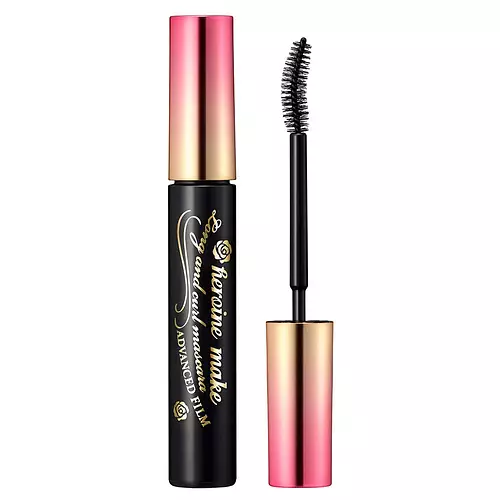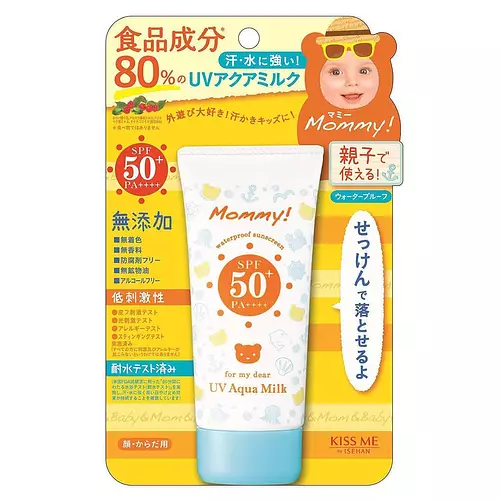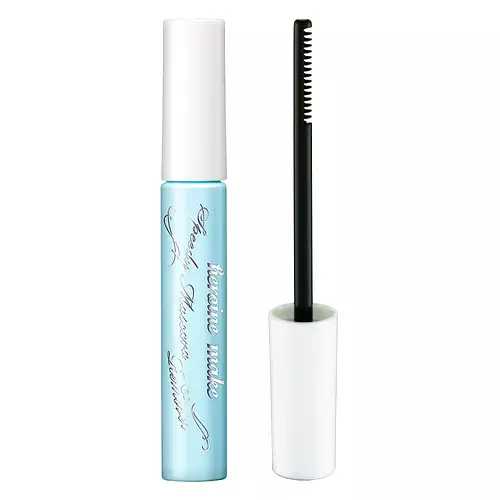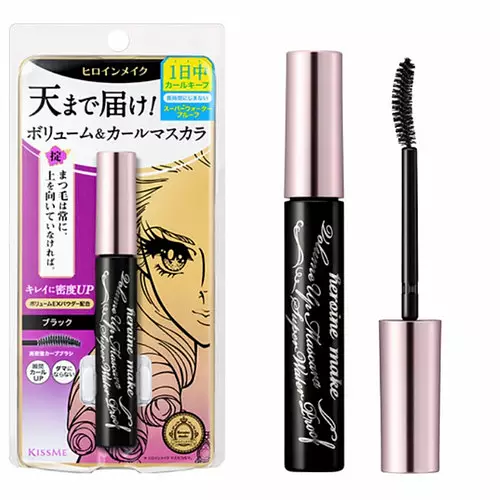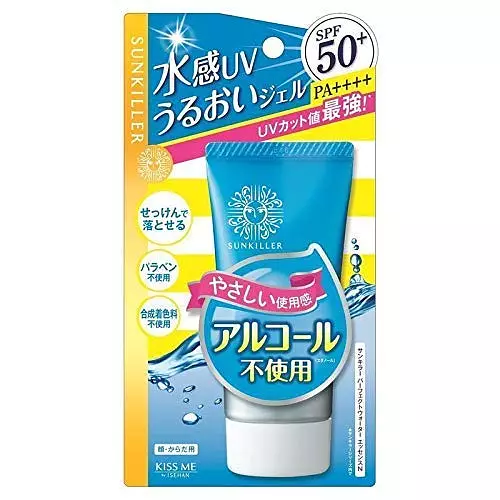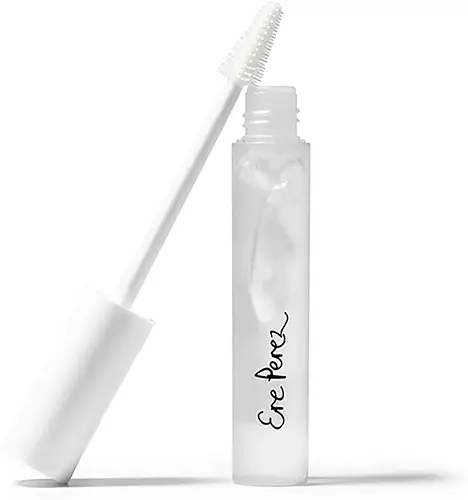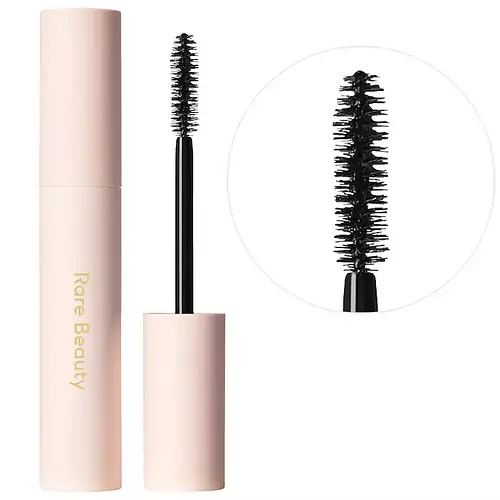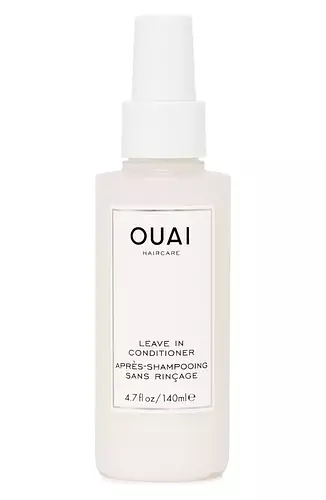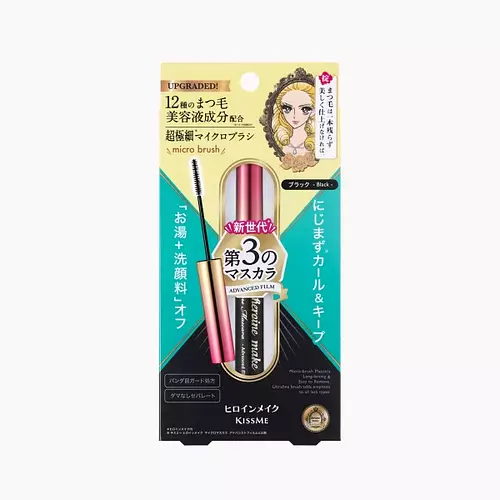
ISEHAN Heroine Make Micro Mascara Advanced Film EX Ingredients Explained
Updated on November 29, 2023 Submitted by BugHunter
Overview
What it is
Mascara with 38 ingredients that contains exfoliants
Suited For
It has ingredients that are good for dry skin and scar healing
Free From
It doesn't contain any harsh alcohols, common allergens, fragrances, parabens or sulfates
Fun facts
ISEHAN is from Japan. This product is used in 2 routines created by our community.
We independently verify ingredients and our claims are backed by peer-reviewed research. Does this product need an update? Let us know.
Mascara with 38 ingredients that contains exfoliants
Quick info
You should know
Notable Ingredients
This product contains 3 ingredients that may have this attribute:
Benefits
This product contains 3 ingredients that may have this attribute:
This product contains 1 ingredient that may have this attribute:
Concerns
This product contains 2 ingredients that may have this attribute:
This product contains 1 ingredient that may have this attribute:
This product contains 1 ingredient that may have this attribute:
Ingredients 38
This silicone is an emollient. Emollients create a thin film on the skin to prevent moisture from escaping.
Talc is a clay mineral. It helps absorb moisture and improve the texture of products. Like other types of clay, Talc can have a slight exfoliating effect on skin. Talc can be added to increase the volume of products.
Ceresin is a wax derived from ozokerite. It is an alternative to beeswax.
Disteardimonium Hectorite comes from the clay mineral named hectorite. It is used to add thickness to a product.
Dextrin Palmitate comes from the palmitic acid ester of Dextrin. It is used as an emulsifier and texture enhancer.
Synthetic Wax is created from fossil fuels such as natural gas. It is used to enhance texture, adjust pH, and as an occlusive.
Ci 77499 is also hydrated iron III oxide. It is created from mixing red and black iron oxides. This helps give shades of darkness to a product.
Hydrogenated Polyisobutene is a synthetic polymer. Polymers are compounds with high molecular weight. Hydrogenated Polyisobutene is an emollient and texture enhancer.
Peg-10 Hydrogenated Castor Oil is an oil and isn't fungal acne safe.
This ingredient is a solvent. It helps dissolve active ingredients and alter the texture of products.
Glyceryl Isostearate is a mixture made from glycerin and isostearic acid.
Polymethylsilsesquioxane is a silicone used as a film forming agent.
Squalane is an emollient that helps the skin hold onto moisture. It's an oily liquid that occurs naturally in certain types of fish and plant oils.
Argania Spinosa Kernel Oil is derived from the kernels of the argania spinosa tree. You may know it as argan oil.
Arginine is an amino acid that is important for human development. Your body uses is it to produce hair keratin and skin collagen.
Butyrospermum Parkii Butter is a plant lipid from the fruit of the Shea Tree. It is an effective skin hydrator and emollient.
Camellia Japonica Seed Oil comes from the Japanese Camellia plant. This plant is native to East Asia and known as "Tsubaki" in Japanese.
Hydrolyzed Keratin is derived from keratin. Keratin is a large protein that is naturally found in our hair and skin.
Prunus Amygdalus Dulcis Oil comes from the sweet almond, a tree native to Iran. This oil has no fragrance and is non-volatile.
Rosehip Oil is a nonfragrant plant oil. Rosehips are a fruit from a rose bush and are edible. This oil helps even out skin tone, has anti-aging properties, and is good for reducing inflammation.
Vitis Vinifera Seed Oil comes from the grape vine. Grape seeds are a byproduct of creating grape juice or wine.
Silica is a mineral naturally found in our skin. It helps to thicken and smooth the texture of a product. It also acts as an agent for other ingredients by increasing the absorption of other ingredients into the skin.
Titanium dioxide is known for its UVA and UVB protection properties. It is non-comedogenic and non-irritating. Titanium Dioxide is a physical sunscreen. Physical sunscreens reflect light and prevent it from reaching your skin.
Dimethicone is a silicone used for making products smooth and silky. It also has the added benefit of sealing in hydration. The amount of dimethicone found in beauty products is considered safe and non-comedogenic, meaning it won't clog pores.
Panax Ginseng Root is a popular herb from Asia. This root contains antioxidants, favonoids, and vitamins B12 and D.
Royal Jelly Extract comes from a secretion made by worker honeybees. This secretion is white and described as creamy.
This ingredient is a preservative with antimicrobial properties. It is the sodium salt of dehydroacetic acid.
Isododecane, Trimethylsiloxysilicate, Talc, Ceresin, Disteardimonium Hectorite, Dextrin Palmitate, Synthetic Wax, CI 77499, Hydrogenated Polyisobutene, Peg-10 Hydrogenated Castor Oil, Propylene Carbonate, Sucrose Tristearate, Aluminum Distearate, Glyceryl Isostearate, Trimethylsiloxysilylcarbamoyl Pullulan, Polymethylsilsesquioxane, Zinc Laurate, Nylon-66, Squalane, Argania Spinosa Kernel Oil, Arginine, Butyrospermum Parkii Butter, Camellia Japonica Seed Oil, Hydrolyzed Keratin, Prunus Amygdalus Dulcis Oil, Rosa Canina Fruit Oil, Silk Powder, Vitis Vinifera Seed Oil, Silica, Titanium Dioxide, Acrylates Copolymer, Ammonium Acrylates Copolymer, 2-Hydroxyethyl Acrylate, Dimethicone, Panax Ginseng Root Extract, Eriobotrya Japonica Leaf Extract, Royal Jelly Extract, Sodium Dehydroacetate
Ingredient Ratings
Based on the number of likes and dislikes each ingredient has received.
Ingredients Explained
Isododecane is a fragrance, emollient, and solvent.
As an emollient, it helps your skin stay soft and hydrated. Emollients help trap moisture into your skin.
Isododecane's role as a solvent makes it a great texture enhancer. It spreads smoothly on skin and does not leave a sticky feeling behind. Isododecane also helps prevent color transfer in makeup products.
Isododecane is not absorbed into skin.
Learn more about IsododecaneThis silicone is an emollient. Emollients create a thin film on the skin to prevent moisture from escaping.
It is not soluble in water and helps increase water-resistance in products.
According to a manufacturer, it can blend seamlessly with silicone oils, such as Cyclopentasiloxane.
Learn more about TrimethylsiloxysilicateTalc is a clay mineral. It helps absorb moisture and improve the texture of products. Like other types of clay, Talc can have a slight exfoliating effect on skin. Talc can be added to increase the volume of products.
Some Baby powders are made by combining talc with corn starch. The word "talc" comes from Latin and originates from Arabic. Talc is a mineral commonly found throughout the world.
If you have any concerns about using talc, we recommend checking out the FDA's official page.
Learn more about TalcCeresin is a wax derived from ozokerite. It is an alternative to beeswax.
The most common process of creating ceresin is by using heat and sulfuric acid.
Disteardimonium Hectorite comes from the clay mineral named hectorite. It is used to add thickness to a product.
It can also help stabilize a product by helping to disperse other ingredients.
Hectorite is a rare, white clay mineral.
Learn more about Disteardimonium HectoriteDextrin Palmitate comes from the palmitic acid ester of Dextrin. It is used as an emulsifier and texture enhancer.
Emulsifiers help keep ingredients together. According to a manufacturer, dextrin palmitate helps create a low-viscosity gel texture.
Due to its fatty acid base, this ingredient is not fungal-acne safe.
Learn more about Dextrin PalmitateSynthetic Wax is created from fossil fuels such as natural gas. It is used to enhance texture, adjust pH, and as an occlusive.
It may also be used as an abrasive ingredient to exfoliate the skin.
Synthetic Wax may not be fungal acne safe.
Learn more about Synthetic WaxCi 77499 is also hydrated iron III oxide. It is created from mixing red and black iron oxides. This helps give shades of darkness to a product.
Iron III oxides are classified as inorganic chemicals for coloring.
Hydrogenated Polyisobutene is a synthetic polymer. Polymers are compounds with high molecular weight. Hydrogenated Polyisobutene is an emollient and texture enhancer.
In one study, Hydrogenated Polyisobutene showed better skin hydration levels than Caprylic/Capric Triglyceride. As an emollient, it helps keep your skin soft and hydrated by trapping moisture in.
Hydrogenated Polyisobutene is often used as a mineral oil replacement.
Learn more about Hydrogenated PolyisobutenePeg-10 Hydrogenated Castor Oil is an oil and isn't fungal acne safe.
This ingredient is a solvent. It helps dissolve active ingredients and alter the texture of products.
Propylene Carbonate is commonly used in makeup and with clay, such as montmorillonite or bentonite.
Studies show this ingredient to be safe for cosmetics. When it is undiluted, it can cause skin irritation. (It is always diluted in skincare and makeup). This ingredient is water-soluble.
Propylene Carbonate is created from propylene glycol and carbonic acid.
Learn more about Propylene CarbonateSucrose Tristearate isn't fungal acne safe.
We don't have a description for Aluminum Distearate.
Glyceryl Isostearate is a mixture made from glycerin and isostearic acid.
Glyceryl Isostearate is an emollient. Emollients create a barrier to trap moisture in. This helps keep your skin hydrated.
Glyceryl Isostearate also helps make the texture of a product thicker.
Glyceryl Isostearate isn't fungal acne safe.
Learn more about Glyceryl IsostearateWe don't have a description for Trimethylsiloxysilylcarbamoyl Pullulan.
Polymethylsilsesquioxane is a silicone used as a film forming agent.
When applied to the skin, this ingredient creates an invisible film on the surface. This film still allows oxygen to pass through, but prevents moisture from escaping. This can help condition and hydrate the skin. It also leaves a silky feel when applied.
Polymethylsilsesquioxane has not been shown to clog pores. It has been deemed safe to use up to 55%, but most cosmetics use much less.
If you have concerns about using this ingredient, we recommend speaking with a professional.
Learn more about PolymethylsilsesquioxaneWe don't have a description for Zinc Laurate.
We don't have a description for Nylon-66.
Squalane is an emollient that helps the skin hold onto moisture. It's an oily liquid that occurs naturally in certain types of fish and plant oils.
Because squalane boosts hydration in the skin, it also comes with plenty of benefits: it is an antioxidant and can help fight free radicals and skin damage. Squalane is also found to have a detoxifying effect when applied.
Squalane comes from squalene, which occurs naturally within the sebum of our skin. It is one of the oils our skin produces to keep itself hydrated. Squalane is the hydrogenated version of squalene and has a longer shelf life.
Research shows that squalane is non-irritating (even at 100% concentration).
In general, it's a fantastic ingredient. It does a great job at hydrating the skin, and it's suitable for those with sensitive skin.
The source of squalane may impact malassezia / fungal acne. This is because olive oil derived squalane can contain impurities such as fatty acids and plant waxes. Sugarcane derived squalane is recommended for anyone with malassezia concerns.
Is squalane vegan?
This depends on the source. Squalane can be derived from both plants and animals. Most squalane used in skincare comes from plants.
Please note: the source of squalane is only known if disclosed by the brand. We recommend reaching out to the brand if you have any questions about their squalane.
Read more about squalene with an "e".
Learn more about SqualaneArgania Spinosa Kernel Oil is derived from the kernels of the argania spinosa tree. You may know it as argan oil.
Argan Oil is an antioxidant, hydrating, and soothing ingredient.
Studies have shown argan oil can help fight again radical damage from the sun. This makes it effective at preventing hyperpigmentation.
Large amounts of vitamin E found in argan oil helps the skin retain water. Argan oil also contains fatty acids such as linoleic acid, oleic acid, and palmitic acid. It is also a good source of lipids.
Another benefit of argan oil is skin-soothing. It can help reduce inflammation-related skin symptoms.
Argan Oil is effective at regulating sebum production in pores. This can make it effective at treating hormonal acne.
Traditionally, argan oil was used for its antibacterial and antifungal properties. However, argan oil contains fatty acids that may make it not fungal-acne safe.
Argan Trees are native to Morocco.
Learn more about Argania Spinosa Kernel OilArginine is an amino acid that is important for human development. Your body uses is it to produce hair keratin and skin collagen.
As a cosmetic ingredient, Arginine has antioxidant properties and can also help repair damaged skin. This ingredient is derived either synthetically or from animals.
Arginine isn't fungal acne safe when used in the presence of other lipids (fats, fatty acids, oils, esters, etc). Oils and fats occur naturally within the skin, so take caution when using Arginine if you're prone to fungal acne.
Learn more about ArginineButyrospermum Parkii Butter is a plant lipid from the fruit of the Shea Tree. It is an effective skin hydrator and emollient.
Emollients help soothe and soften your skin. It does this by creating a protective film on your skin. This barrier helps trap moisture and keeps your skin hydrated. Emollients may be effective at treating dry or itchy skin.
Shea butter is rich in antioxidants. Antioxidants help fight free-radicals, or molecules that may harm the body. It is also full of fatty acids including stearic acid and linoleic acid. These acids help replenish the skin and keep skin moisturized.
While Shea Butter has an SPF rating of about 3-4, it is not a sunscreen replacement.
Shea butter may not be fungal acne safe. We recommend speaking with a professional if you have any concerns.
Learn more about Butyrospermum Parkii ButterCamellia Japonica Seed Oil comes from the Japanese Camellia plant. This plant is native to East Asia and known as "Tsubaki" in Japanese.
Camellia Japonica Seed Oil is rich in oleic acid. This makes it a great emollient. Emollients help soften and soothe the skin by forming a barrier. This barrier traps moisture within, keeping your skin hydated.
Hydrolyzed Keratin is derived from keratin. Keratin is a large protein that is naturally found in our hair and skin.
Studies show keratin is able to seal broken hair cuticles, helping to prevent split ends and breakage.
As a humectant, hydrolyzed keratin helps draw moisture from the air to your hair and skin. This helps keep your skin and hair hydrated.
Learn more about Hydrolyzed KeratinPrunus Amygdalus Dulcis Oil comes from the sweet almond, a tree native to Iran. This oil has no fragrance and is non-volatile.
Almonds contain healthy fats, vitamins, and minerals. It is a rich source of Vitamin E, a great antioxidant and skin conditioning ingredient. Sweet almond oil contains fatty acids such as linolenic acid and triglycerides.
The content of sweet almond oil makes it a great emollient; it can help soften and hydrate your skin. Emollients create a barrier over your skin to trap moisture in. Sweet almond oil has antioxidant properties. This may help with anti-aging, as antioxidants help fight free-radicals. Free-radicals are unstable molecules that may damage your skin's cells.
Those with an almond allergy should be careful of this ingredient and speak with a professional about using it in your skincare.
This ingredient may not be fungal-acne safe.
Learn more about Prunus Amygdalus Dulcis OilRosehip Oil is a nonfragrant plant oil. Rosehips are a fruit from a rose bush and are edible. This oil helps even out skin tone, has anti-aging properties, and is good for reducing inflammation.
Rosehip contains Vitamin C, Vitamin E, fatty acids and linolenic acids. These nourish your skin barrier. Having hydrated skin may help reduce the appearance of fine-lines and wrinkles.
Another great component of Rosehip Oil is Vitamin A, or retinol. Vitamin A encourages your skin to create more collagen.
Rosehip oil may help with reducing pigmentation. The lycopene and beta-carotene have skin-lightening properties.
Learn more about Rosa Canina Fruit OilWe don't have a description for Silk Powder.
Vitis Vinifera Seed Oil comes from the grape vine. Grape seeds are a byproduct of creating grape juice or wine.
The components of grape seeds have many skin benefits. Research has found it to be antimicrobial and anti-inflammatory. It also contains many potent antioxidants such as Vitamin E , Vitamin C, proanthocyanidins, polyphenols, flavonoids, and anthocyanins. Proanthocyanidin has been shown to help even out skin tone.
Antioxidants help fight free-radical molecules. Free-radical molecules are capable of damaging our cells and other genetic material. Antioxidants help stabilize free-radicals by donating extra electrons. Grape seed extract may help reduce the signs of aging.
The antimicrobial properties of grape seed may help treat acne. However, more research is needed to support this claim.
Grape seed has also been found to help absorb UV rays. Grape seed extract should not replace your sunscreen.
The fatty acids of grape seed oil give it emollient properties. Emollients help soothe and soften your skin by creating a film. This film traps moisture within, keeping your skin hydrated.
Learn more about Vitis Vinifera Seed OilSilica is a mineral naturally found in our skin. It helps to thicken and smooth the texture of a product. It also acts as an agent for other ingredients by increasing the absorption of other ingredients into the skin.
Silica is often used for absorption and can help reduce shine when products are applied. Silica occurs in naturally in materials like clay and sandstone, and it can also be produced synthetically.
Silica is present naturally within the skin during collagen production and when reducing inflammation.
Learn more about SilicaTitanium dioxide is known for its UVA and UVB protection properties. It is non-comedogenic and non-irritating. Titanium Dioxide is a physical sunscreen. Physical sunscreens reflect light and prevent it from reaching your skin.
Protecting your skin against UV radiation can prevent the signs of aging. Sun damage is associated with fine-lines, wrinkles, loss of firmness, and hyperpigmentation. Titanium dioxide can help prevent premature aging.
With modern production, nano-scale or fine-grade titanium dioxide can be easily produced for cosmetics. In sunscreen, titanium dioxide absorbs UV light. Our skin is not able to absorb Titanium dioxide, even nanoparticles.
Titanium itself is the 9th most common element in the Earth's crust. Titanium dioxide is formed when oxygen is introduced and can be found in ores, dust, sand, and soil.
Pure titanium dioxide is a white powder that is used in many products to add or change color.
Learn more about Titanium DioxideAcrylates Copolymer is used as a film-forming agent and texture enhancer.
After applied, Acrylates Copolymer forms a thin film cover that helps skin feel more soft. It can help sunscreens become more water-resistant.
It is also used to make a product more thick.
Learn more about Acrylates CopolymerWe don't have a description for Ammonium Acrylates Copolymer.
We don't have a description for 2-Hydroxyethyl Acrylate.
Dimethicone is a silicone used for making products smooth and silky. It also has the added benefit of sealing in hydration. The amount of dimethicone found in beauty products is considered safe and non-comedogenic, meaning it won't clog pores.
Dimethicone has been found increase absorption in skin, boosting the benefits of other ingredients. While there is concern for the safety of dimethicone, the levels used in skincare are safe for use.
Panax Ginseng Root is a popular herb from Asia. This root contains antioxidants, favonoids, and vitamins B12 and D.
Ginseng Root helps increase skin hydration, even out texture and tone, and helps improve wrinkles.
Ginseng root helps improve blood circulation and oxygen flow. This in turn helps nourish the skin and improve wrinkles. By speeding up circulation, ginseng root can also help drain fluids.
Ginseng root contains both Vitamin D and B12. Both of these vitamins help boost collagen production in your skin. Collagen gives you skin the appearance of looking plump and firm.
Ginseng Root can also aid in decreasing inflammation.
Studies also show ginseng may help with hyperpigmentation. Ginseng disrupts the production of tyrosinase, an enzyme that starts the process of skin darkening.
Historically, people in East Asia have used ginseng as both food and medicine.
Learn more about Panax Ginseng Root ExtractWe don't have a description for Eriobotrya Japonica Leaf Extract.
Royal Jelly Extract comes from a secretion made by worker honeybees. This secretion is white and described as creamy.
Royal Jelly contains antibacterial, anti-aging, and anti-inflammatory properties.
Studies show Royal Jelly to contain amino acids, fatty acids, and a variety of vitamins, including Vitamin Bs. Many of these components are antioxidants, which help with anti-aging. The fatty acids in Royal Jelly make it a hydrating ingredient.
Several animal studies show Royal Jelly to boost collagen production and reduce inflammation.
The Vitamin Bs found in Royal Jelly include:
Learn more about Royal Jelly ExtractThis ingredient is a preservative with antimicrobial properties. It is the sodium salt of dehydroacetic acid.
It is especially effective at preventing bacterial and fungal growth in low concentrations.
When to use
How this product is used by our community
Compared With
Here are some products that it's often compared with
More ISEHAN Products
See all ISEHAN productsMore Mascaras
See all mascarasWe're dedicated to providing you with the most up-to-date and science-backed ingredient info out there.
The data we've presented on this page has been verified by a member of the SkinSort Team.
Read more about us


